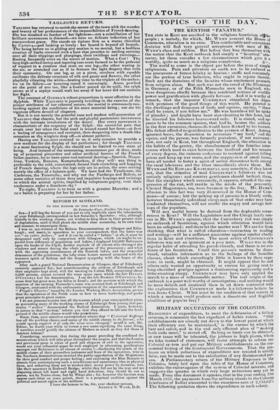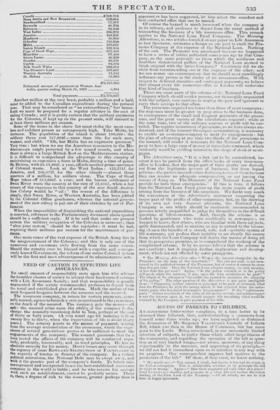MILITARY OCCUPATION OF THE COLONIES.
REDUCTION of expenditure, to meet the deficiencies of a falling revenue, is commonly the last expedient of feeble rulers. "Our establishments are already cut down to the lowest point at which their efficiency can be maintained," is the excuse by which the best and safest, and in the end only efficient plan of " making both ends meet," is staved off. So long us loans can be obtained, or new taxes will be tolerated, the jobbers in high places, whom we take instead of statesmen, will resist attempts to reform our Colonial system and put our Military establishments on the eco- nomical footing of the Continental Governments. That the pre- tence on which reductions of expenditure are resisted is utterly false, can be made out to the satisfaction of any disinterested per- son. A Parliamentary return of the Military Expenses in the Colonies, lately laid upon the table of the House of Commons, exhibits the extravagance of the system of Colonial misrule, and suggests the quarter in which very large reductions may yet be made. From this document it appears, that in the year ending 31st March 1837, the payments from the military chests in the Colonies (exclusive of India) amounted to the enormous sum of 2,733,6271. The following quotation shows the expenditure in each colony.
Canada £219,718 Nova Scotia and New Brunswick 139,664 Newfoundland 17,317 Bermuda 48,734 Bahamas 32,3:30 West Indies 286,972 Jamaica 423,231 Honduras 16,910
Gibraltar 116,958
Malta 167,671 Ionian Islands 132,104 Cape of Good Hope 313,410 Mauritius 97,410
Sierra Leone 46,209
Gambia 10,171 Ceylon 94,1544 New South Wales 328,318 Van Dienten's Land 167,607 Western Australia 17,112 St. Helena 51,893 £2,727,923 Estimated amount of payments at Western Aus- tralia, quarter ending March 31, 1837 5,704
Total payments £2,733,627 Another million at the very least, probably a million and a half, must be added to the Canadian expenditure during the present year. That may be considered as "an extraordinary," but hence- forth we must be prepared for a regular advance in the cost of ruling Canada ; and it is pretty certain that the military payments for the Colonies, if kept up on the present scale, will amount to at least three millions per annum.
Some of the items in the above list must strike the most care-
less and indolent person as outrageously high. Take Malta, for instance. The population of the island is about 100,000: the soldiery there cost 167,000/.—more than 308. for each man, woman, and child. "Oh, but Malta has an expensive garrison." Very true ; but when we see the American commerce in the Me- diterranean amply protected by a few armed vessels, and when there is always a large British tleet on the Mediterranean station, it is diflicult to comprehend the advantage to this country of maintaining so expensive a force in Malta, during a time of peace. St. Helena, with its 51,0001. a year, affords another prime specimen of Colonial waste. Look at the West Indies : 923,231/. for Jamaica, and 296,972/. for the other islands —almost three quarters of a million, for soldiers alone. The Cape of Good Hope takes off 313,000/. a year; and the barren settlement of Swan River costs the country at the rate of 22,816/., while a fair return of the expenses to this country of the new South Austra- lian Colony would be " nil :" the reason of the difference is simply, that Swan River, or Western Australia, has been jobbed by the Colonial Office gentlemen, whereas the internal govern- ment of the new colony is put out of their clutches by act of Par- liament.
When the impossibility of diminishing the national expenditure is asserted, reference to the Parliamentary document above quoted Should be a sufficient reply. If it be said that under our present system the military occupation of the Colonies is necessary, then "alter your system" should be the rejoinder : it must be bad, requiring three millions per annum for the maintenance of gar- risons.
One main cause of the vast expense of the British Army lies in the misgovernment of the Colonies; and this is only one of the numerous and enormous evils flowing from the same source. Should the country ever be blessed with a capable and courage- ously honest Government, the reform of our entire Colonial system will be the first and most advantageous of its administrative acts.



























 Previous page
Previous page